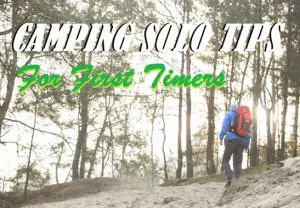 If you are in desperate need of some alone time, there is nothing quite like a solo camping trip to give you peace, quiet and serenity. However, there are some unique challenges to preparing for and going it alone so check out these 10 tips for solo camping first timers.
If you are in desperate need of some alone time, there is nothing quite like a solo camping trip to give you peace, quiet and serenity. However, there are some unique challenges to preparing for and going it alone so check out these 10 tips for solo camping first timers.
Going car camping is significantly different to wild camping solo. Car camping has access to power, amenities and close by campers, so you generally feel safer. While wild camping solo is the complete opposite and is something that I don’t recommend on your first solo camping trip. It can be quite daunting, scary and even dangerous. For the first time wild camping, it can be quite intimidating.
Solo Camping Is Scary
Especially if you are young, inexperienced and have anxiety. This form of camping alone is enough to bring on anxiety. So my first tip is to avoid solo wild camping if you have never solo camped before.
If you are dead-set on going wild for your solo trip, my suggestion is to first spend the night out back in your yard/garden. What this does is warms you up to the idea of being separated from society. It gets you use to the colder air, the noises, animals roaming freely at night. Doing this gives you the small amount of confidence needed to take the next step.
Packing For One
One of the benefits of camping in a group is that you can share the load of what is needed at the campsite. Camping solo means that you may need to strip down to the bare necessities for your camping trip to ensure that you can get all you need to your chosen camping spot easily and without breaking your back or leaving you exhausted.
One of the most forgotten yet essential items required to take solo camping is the First Aid kit. Please make a note to remember to bring this with you. If you haven’t got one. Then go buy one, they are not that expensive, yet could save your life. Fore more safety tips, read our guide to camp safety.
Camping Equipment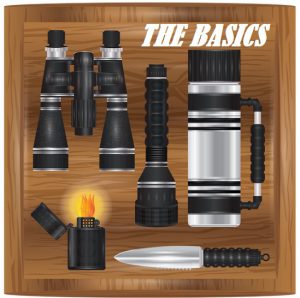
Nine times out of ten, a first time solo camper will bring way too much gear. But this is completely fine. It means you are being prepared, you have most likely watched a lot of ‘things to pack for camping’ videos and listened to all the different instructions and so forth. So you are packing enough equipment that nothing goes wrong.
But the truth is something probably will go wrong. But as you are super prepared, it should only be a minor problem compared to a major problem like forgetting to bring water or the tent!.
Learn from your first solo camping trip. Write a list of the items you used the most, rarely and not at all. Then go through the items and see which items you most likely won’t need for the second night you plan to go solo camping. Eventually you will scale down you amount of items needed to a more manageable size list.
Tent Vs Hammock For Solo Camper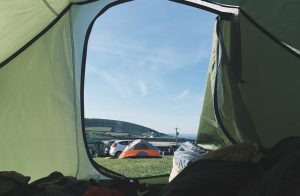
Setting up a tent and other camping equipment can be difficult on your own. So regardless of what your means of sleeping are, first practice the set up procedure in your back yard.
There are three main methods of solo camping. They are tent camping, hammock camping and a camping cot tent.
The Tent
A tent is probably the safest option for a first time solo camper. Having the four walls around you will help bring down and anxiety and or fear you may have on your first experience. If weight is a concern to you, buy a 1 person tent. If you are camping nearby your car, live large and by at least a two person tent.
The Hammock
Consider a hammock to sleep in (it will keep you off the ground which can be safer) rather than a tent. A camping tent hammock is the absolute best option to take if you prefer the lifestyle of sleeping in mid air.
These hammocks are enclosed in a 360° insect proof netting and come with a attached rain fly. So you are getting all the benefits of a tent, but receiving the greatest benefit of hammock camping that is comfort.
Camping Cot Tent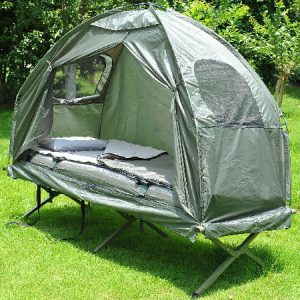
A lessor known but growing in popularity solution for solo campers are the cot tents. These are your traditional camping tents, but include a tent like dome on top.
These cot tents provide protection from insects and includes a rainfly to completely protect you from rain and wind. Best of all, they are raised off the ground so you have no chance of getting a wet backside.
Some camping cot tents come with a sleeping bag and can fit a self inflating air mattress inside or greater comfort. If you are traveling light, this is the way to go over a hammock or tent in my opinion.
Torch/Head light
Don’t forget about how dark it gets at night. Yes you may have a campfire going, and yes the days are longer during Summer. But it does get dark. So be prepared with some sort of light device whether it be a torch, headlamp, LED lanterns or a solar powered light.
Battery operated lights are the best when first getting started as you are a bit more reliant when you use flames. Things can certainly go wrong.
Checklist – Who’s Checking It Twice?
It is of utmost importance to have a checklist ready and that you plan your route meticulously. Check and recheck your list obsessively to ensure that you aren’t leaving anything behind.
This includes, food, water, camping axe, camp gear, sleeping gear, clothing, deterrents, first aid, sleeping gear, communication means, etc.
Seclusion Is Nice, But Here’s A Tip
Although peace and quite may be what you are looking for, it is not a good idea to go too far off the beaten track or into an area that is too secluded on a solo session. Especially if it’s your first time. It is also best not to stray to far from your campsite.
Let people know exactly where you will be located and how long you will be away. Make sure there is someone who will answer the phone should you ring. Your Parents, your friends, your employer. It doesn’t matter. What matters is not disappearing in the wilderness without a sound.
Communication Matters When Solo Camping – No Not To Yourself
It is advisable to choose a spot where there is some mobile phone service or where you can at least get a signal a short walk from your campsite in case of emergencies. A CB radio is a good idea if you are camping in a secluded area where you are unlikely to run into other humans or there is not service for miles around. A satellite phone or signal beacon is also a good idea.
Start With A short Solo Camping Adventure
Some camping experts recommend just one or two nights whereas other pros’ tips for solo camping advise a stay of at least one week. The second group believe that a short stay simply doesn’t give you the full experience and can leave you spooked into never attempting a solo experience ever again. However, it is advisable to start with a weekend and work your way up to longer trips.
Water – More Than Enough!
Always bring more water than you could possibly think you will need. There’s nothing worse than falling short on water when solo camping. Once you have made camp base, find a water source nearby, or make your base camp specifically located where you know an existing water source is located.
If you find a nearby water source, check that it is safe. If it rains, is the water running from fields that could potentially have chemicals sprayed from local Farmers?. At the end of the day, water is what keeps us alive. So make sure you bring enough with you.
Do You Like Tranquility?
Camping is filled with different tasks that must be accomplished on an ongoing basis. There will be times when the big open spaces, a lack of things to do and plain old boredom can get to you.This is especially relevant during Winter as the Sun goes down much earlier and you have less outdoors activities you can do without daylight.
So make a list of tasks and perform these when you have too much time on your hands and take a good book or other items to entertain you. Keeping a journal is also a great idea for writing down your experiences as well as the deep and insightful thoughts you will have during your solo experience. Bring some reading materials for the night time. Something like a survival or bush craft book so that you can learn more about camping in the outdoors while actually camping and giving you the practical experience.
Check The Weather/Time Of Year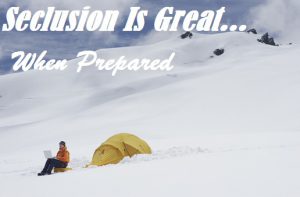
Before you leave, check the weather. If there are any weather warnings in the area where you are planning your trip, cancel or postpone. Expect and prepare for rain, wind, snow or other inclement weather even if the report says you will have perfect sunny days for the entire trip.
On your first solo camping trip, my tip would be to avoid winter camping and possibly even beach camping. The sub zero temperatures and wind gusts can really turn a camping trip sour if you are not 100% prepared. Temperatures can drop drastically overnight and if you are not well prepared. Well you’re going to freeze your arse off. Autumn and Summer are the best times to go solo camping.
Consider The Environment
Just because you are camping solo doesn’t mean you are alone. So be considerate to the wildlife around you as well as other campers in the vicinity. If another group camps near you, simply move your campsite, remembering not to stray too far. Also clean up your campsite properly and leave it in the state you found it for the next soloist.
It cannot be stressed enough that camping alone is risky and dangerous so keep these top tips for solo camping in mind at all times, no matter how short or long you plan to stay. Remember that you can never be too prepared for the great outdoors.
